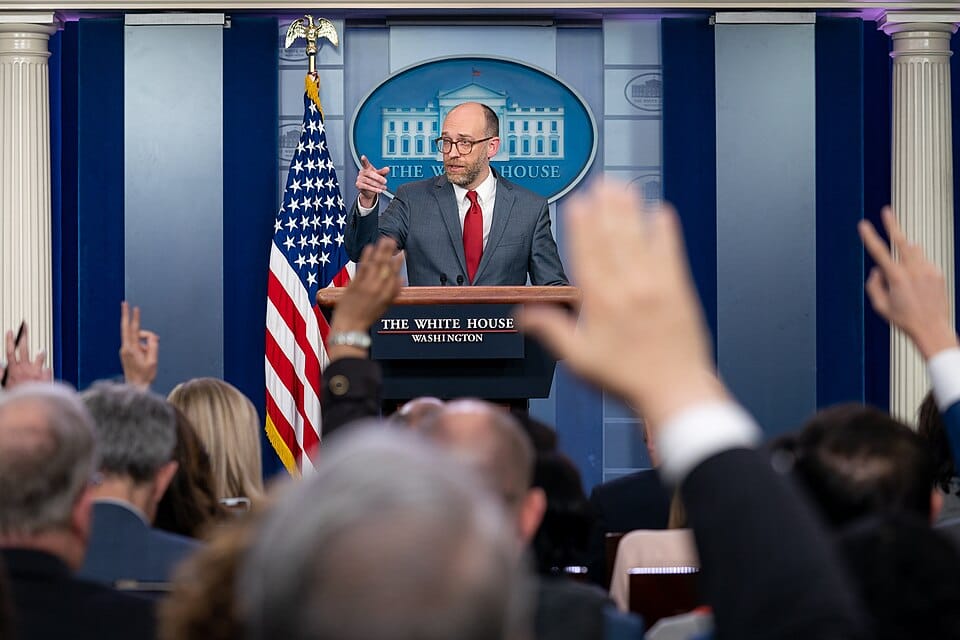With Appeals Court Considering a Stay in Rhode Island Case, the IMLS Is Once Again Facing Uncertainty
Can DOJ lawyers sow enough uncertainty to keep the courts at bay until the destruction of the IMLS is complete? An appeal before the First Circuit to stay a Rhode Island court's IMLS injunction will be a major test.

The immediate future of the IMLS is hanging in the balance as attorneys for 21 states this week urged the U.S. Court of Appeals for the First Circuit not to stay a Rhode Island judge’s preliminary injunction blocking the Trump Administration from dismantling the agency.
In a 34-page filing this week, lawyers for 21 plaintiff states argue that Judge John J. McConnell’s May 13 injunction was properly issued—an argument that comes a week after another judge, Richard J. Leon in Washington D.C., reversed course and declined to issue an injunction in a parallel case brought by the American Library Association, holding that—contrary to McConnell’s findings in Rhode Island—the district court likely lacked jurisdiction over the case.
Among the arguments in the DOJ's May 21 appeal for a stay from the First Circuit, DOJ lawyers assert that McConnell’s “sweeping preliminary injunction” suffers from “numerous defects” and “legal errors.” Those errors led the court to order relief, "including the reinstatement of employees and grant contracts," which, DOJ lawyers argue, the court had “no jurisdiction to provide" because "Congress has channeled such claims to other forums," such as the Federal Court of Claims, under the Tucker Act.
According to the DOJ, the litigation around the administration's dismantling of the IMLS is effectively a contract dispute, at the center of which is the government’s decision to cancel more than 1,000 grants, and, consequently, to dismiss the no-longer-needed employees whose jobs are to oversee those grants. And under the Tucker Act, administration lawyers claim, the United States Court of Federal Claims has exclusive jurisdiction over contract disputes with the federal government.
But in opposing the stay, attorneys for the plaintiff states insist McConnell got it right in his May 6 opinion.
“Defendants contend that plaintiffs lack standing, that plaintiffs’ claims are precluded by statute, that defendants’ actions are unreviewable under the Administrative Procedure Act (APA), and that defendants’ statutory violations cannot give rise to a constitutional claim. The district court rejected each of these arguments and defendants identify no error in the district court’s thorough, well-reasoned opinion,” the states’ June 10 filing contends, arguing that the administration is therefore not entitled to the “extraordinary remedy” of a stay pending appeal.
“As the district court properly concluded,” the filing goes on to state, “defendants’ attempts to dismantle the agencies through executive fiat usurped Congress’s power to create and abolish federal agencies, disregarded funds that Congress appropriated, and failed to faithfully execute the laws Congress enacted.”
Notably, McConnell on June 5 denied a DOJ motion asking him to stay his own decision, dismissing the government's arguments in a succinct, six-page opinion that doubled down on the conclusions laid out in his initial 49-page opinion.
“The Court’s conclusion that the defendants’ actions in carrying out the Executive Order violated the Administrative Procedures Act was arbitrary and capricious, ultra vires, and was an unconstitutional intrusion by the Executive branch into the prerogatives of the legislative branch, was not a close call,” McConnell wrote in his June 5 decision denying the DOJ's motion for a stay. “It was supported by all the evidence in the record, and longstanding statutory, common, and constitutional law.”
Raising the Stakes
For the plaintiffs in both IMLS cases, it’s simple: without injunctive relief, the IMLS (as well as several other agencies targeted in Trump’s March 14 executive order) will be swiftly dismantled. And even if the plaintiffs ultimately prevail in the underlying cases, by the time those decisions are delivered the damage will almost certainly be done—and most likely irreversible.
On the other hand, Trump administration lawyers appear to have reverse engineered a legal strategy that seeks to sow enough uncertainty to keep the courts at bay until the destruction of the IMLS and other federal agencies is essentially complete. And the strategy is showing signs of working.
After two significant legal victories in early May, library advocates were feeling better about the chances of saving the IMLS from the cuts mandated in the Trump administration's March 14 executive order. But if a veteran judge like Richard J. Leon can change his mind in a month’s time, as he did in denying the ALA's motion for a preliminary injunction on June 9, then it’s possible the First Circuit might also see enough uncertainty to pause McConnell's decision, pending appeal. After all, the arguments in the two cases are virtually identical.
After initially finding for the ALA on May 1 and issuing a month-long temporary restraining order, Leon’s about face last week has left IMLS grantees outside of the 21 plaintiff states in the Rhode Island case unable to access their grant funding. And should the First Circuit grant the DOJ’s motion for a stay in Rhode Island, administration officials would once again be free to act on their plans to gut the agency—which, library advocates fear, they would do quickly while the wheels of justice grind slowly in the underlying lawsuits.
At the root of the legal uncertainty for IMLS is, well, uncertainty.
In his initial six-page May 1 ruling Leon had little trouble finding for the ALA. But just two days later, the Trump Administration sowed the seeds of doubt by filing a motion for reconsideration in which they cited a May 3 appeals court ruling in Widakuswara v. Lake, an action DOJ lawyers called "strikingly similar" to the IMLS case before Leon.
In Widakuswara, a coalition of Voice of America journalists and grantees won an injunction blocking the Trump administration’s dismantling of the United States Agency for Global Media, which, like the IMLS, was also part of the administration's March 14 executive order.
But in a 2-1 decision, the U.S. Court of Appeals in Washington D.C. stayed the injunction, with judges Gregory G. Katsas and Neomi Rao—both Trump appointees—concluding that the government was in fact likely to prevail on the standing and venue arguments rejected by the district court judge, as well as Leon, who in his initial ruling had waved aside the DOJ's defense with a single footnote, in which he suggested the ALA would "very likely be able to establish that they have standing, that this case is ripe, and this court has jurisdiction.”
The appeal in Widakuswara has since taken a few more twists and turns—including a partial rehearing en banc now pending before the full appeals court. But the uncertainty around its still undetermined outcome proved enough for Leon to backtrack on his initial findings.
Citing Widakuswara and another case in which a sharply divided Supreme Court also issued a stay—Department of Education v. California (which, despite California being in the name, is actually being argued in Massachusetts and is now also on appeal before the First Circuit)—Leon suggested in his June 9 decision to deny the ALA’s motions for relief that “the facts and the law” are “in flux” and thus the ALA could not show a “substantial” likelihood that they would prevail on the merits, the threshold for granting injunctive relief.
“Specifically, the Supreme Court and some judges on our Circuit Court have, in the last few weeks, indicated that cases seeking reinstatement of federal grants belong not in district court but in the Court of Federal Claims,” Leon wrote. “These cases are still pending, but they create a substantial question as to whether plaintiffs' case properly belongs in the Court of Federal Claims.”
While acknowledging that lawyers for the ALA have strongly rejected the argument that the IMLS case is a contract dispute, Leon was unconvinced. “In the final analysis, the court finds that the relief sought is largely contractual,” he wrote. "I have concluded that the Tucker Act may indeed require that plaintiffs bring their case in the court of federal claims."
Notably, McConnell had no such qualms in deciding the case before him. And, among the arguments in their June 10 opposition brief to the First Circuit, attorneys for the 21 plaintiff states in McConnell’s Rhode Island IMLS case again rejected the very same arguments that have apparently swayed Leon to reverse course.
“Contrary to defendants’ contention, the Tucker Act does not divest federal courts of jurisdiction to hear plaintiffs’ claims,” the States’ brief insists. “That plaintiffs cite grant terminations as one component of harm does not transform this action into a contract dispute and thereby deprive the district court of jurisdiction it otherwise has. Whatever the grant terms stipulate, defendants do not assert that they can (or do) supplant the statutory and constitutional duties underpinning plaintiffs’ claims.”
With the initial briefs in the DOJ’s appeal for a stay in the Rhode Island case now submitted, an oral argument before the First Circuit will likely soon be set. And the stakes are sky high. Lawyers Words & Money spoke to agreed that a First Circuit stay in the Rhode Island case would likely be devastating for the IMLS.
At the same time, a swift, forceful decision by the First Circuit denying the administration’s bid for a stay could help matters.
Though Leon denied the ALA’s motion for an injunction, he did so “without prejudice,” meaning that the ALA is free to move the court again for injunctive relief. And while Leon is not bound by the First Circuit, a compelling First Circuit decision on the very same questions also before Leon could open the door for the ALA to move again for injunctive relief.
Meanwhile, after a scheduling order this week, the Widakuswara appeal before the Washington D.C. Circuit Court won’t be fully briefed until July 31. And while the appeals court has ordered oral argument in those cases to be scheduled for “the first appropriate date following the completion of briefing,” a decision in that case—which will certainly be persuasive for Leon, coming from his own circuit—won’t likely be delivered until fall, at the earliest.
Legislative Uncertainty
Meanwhile, action in the courts aside, the IMLS is also fighting for its life in Congress.
In its recent budget proposal, the Trump administration once again proposed the permanent elimination of the IMLS. Furthermore, the Museum and Library Services Act, which funds the grants the IMLS is charged with distributing, is also up for reauthorization—a heavy lift given the draconian cuts to discretionary spending proposed by the administration.

This, of course, not the first time the Trump Administration has proposed to eliminate the IMLS and virtually all federal library funding. In all four years of his first term Trump proposed a federal budget that would permanently eliminate IMLS. But library advocates were able to muster enough bipartisan support during Trump's first term not only to defeat the administration’s proposed shuttering of IMLS, but to win some $26 million in funding increases.
This year's proposal, however, comes at a far more fraught moment politically.
In a letter to Congress accompanying the administration's budget proposal, Office of Management and Budget (OMB) director Russell Vought, also widely credited as the architect of the Heritage Foundation’s Project 2025, which has been cast as a governing blueprint for the second Trump administration, struck a harshly partisan tone. “Over the last four years, Government spending aggressively turned against the American people and trillions of our dollars were used to fund cultural Marxism,” Vought wrote.
In addition to the administration’s unprecedented efforts to indiscriminately gut the federal workforce, Republicans are also seeking billions in offsets in an effort to make Trump’s 2017 tax cut permanent, which the administration hopes to ram through Congress in one big budget bill by July.
Nevertheless, library advocates have been marshaling support from lawmakers and the public to include library funding in the FY 2026 federal budget. In a report in American Libraries, Lisa Varga, associate executive director of ALA’s Public Policy and Advocacy Office in Washington, D.C., said advocacy efforts have been strong, with more senators and representatives this year signing on to efforts to fund libraries.
“There is no shortage of concerning news coming out of Washington, D.C. Threats to library funding. Threats to the very existence of agencies such as IMLS and the Department of Education. The possibility of eliminating library services, technology, and staff is real and unprecedented,” Varga conceded, in her piece. “But we know from years of experience that it is an advantage to start with a strong message and solid support from champions within Congress for libraries as valued institutions worthy of funding.”


